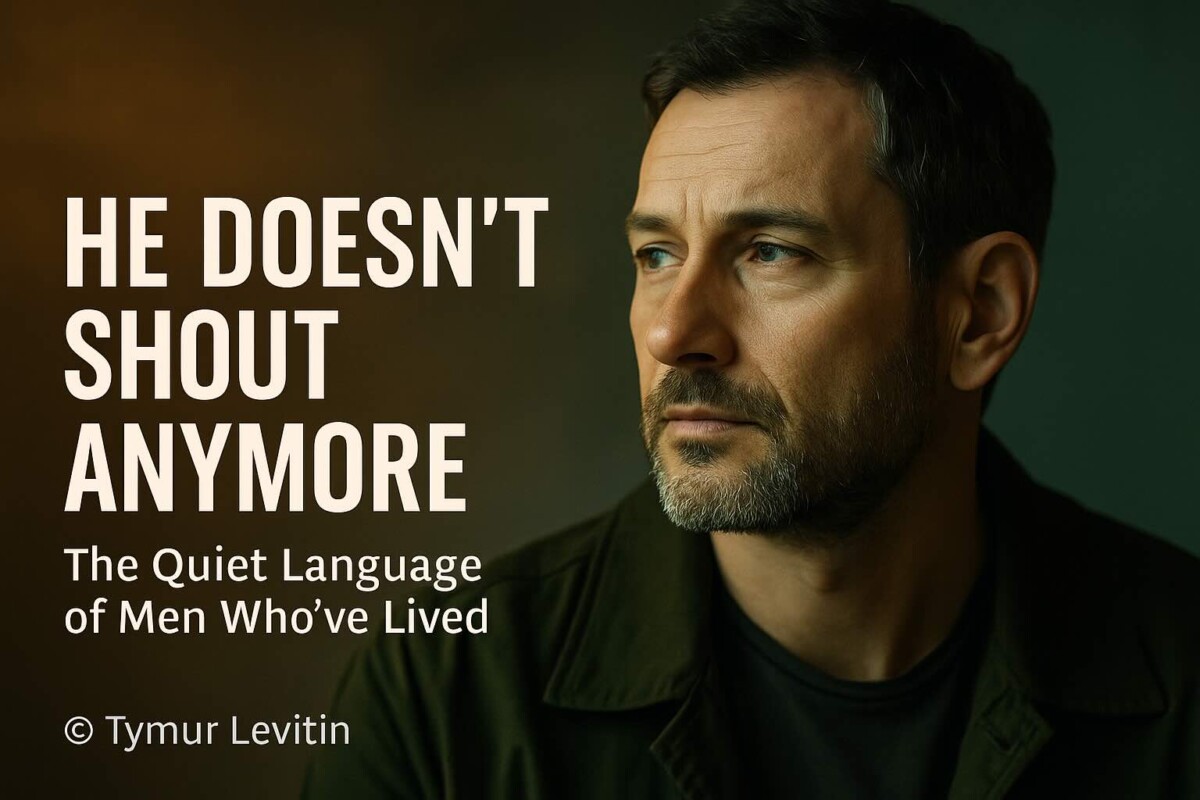What They Say, How They Feel, and Why It’s Not the Same in Every Language
“И я тебя обожаю — а у счастья тоже слёзы солёные…”
(Sergey Kurenkov – «Обожаю»)
Sometimes a man says “Don’t write to me.”
And sometimes he says “I’ll steal you from summer and run.”
Sometimes he’s silent, sometimes he sings.
But the words are never “just words.”
In this article — the opening of a new series — we’re looking at the deep emotional code of songs written by men. Songs where they speak of love, loss, memory, guilt, pride, dreams, distance, tenderness — and how the way they say it is inseparable from the way they feel it.
This is not about rhymes or rhythm.
This is about Sprache, Kulturund Emotionen.
What can be said in Russisch may not exist in English. What sounds bold in Spanisch may sound vulgar in Deutsch. And sometimes, what’s left unsaid matters more than what is.
We will explore that.
A Man Who Writes No Letters
In Mikhail Shufutinsky’s song, the line is direct and formal:
“Не пишите мне писем, дорогая графиня…”
“Don’t write me letters, my dear countess…”
It’s “вы,” not “ты.” Not because of etiquette, but because this isn’t a plea.
This is a barrier.
A man who doesn’t want sympathy. Doesn’t want the past reopened.
The formality is protection.
In English, there is no direct equivalent.
“Don’t write to me, madam” — sounds either sarcastic or archaic.
“Don’t send me letters, please” — lacks the cold elegance.
This is why translation fails.
And this is why we must interpret, not just translate.
A Man Who Leaves Without a Ticket Back
“Скорый поезд, увези меня отсюда…”
“Express train, take me away from here…”
(Petlyura – «Скорый поезд»)
He buys a one-way ticket. He has flowers in his hand.
He knows he might not be met.
And still — he comes. And still — he leaves.
Petlyura’s song is raw, naive, unpolished. He’s not a poet — he’s a man acting on feeling.
And that matters. Because the emotional code is age-specific, class-specific, and deeply cultural.
English wouldn’t use this metaphor.
Spanish might.
Aber die register would change.
In German, you’d need more control.
In Ukrainian, it would sound nostalgic.
In Russian — it’s pain, resignation, and youth all at once.
A Man Who Misses the Chance
Vladimir Asimov’s lyrics capture something rarely sung:
“Были мы случайные попутчики…”
“We were accidental fellow travelers…”
He never speaks to her. She gets off at a quiet station.
And he regrets it for years.
This is not Shakespearean tragedy. This is modern male grief.
Silent, quiet, lonely.
And deeply Russian.
Not in nationality — in code.
In English, you might say:
“I saw her, never spoke, and I still think of her.”
But it wouldn’t be a song. It wouldn’t be enough.
In Russian, it is.
In German, you’d need closure.
In English, you’d need action.
In French, you’d need beauty.
In this song — he just regrets. And it’s okay.
A Man Who Stays
Sergey Kurenkov never says “Don’t write to me.”
He says:
“Заглянув в твои глаза озёрные, потеряю я покой…”
“Looking into your lake-like eyes, I’ll lose my peace…”
And then:
“А у счастья тоже слёзы солёные… а ты не плачь — ведь я тебя обожаю.”
“And happiness has salty tears too… but don’t cry — because I adore you.”
This isn’t the passion of a boy. This is the calm love of a grown man.
He doesn’t escape.
He stays. And cherishes.
And here, we see the power of syntax.
Russian allows this lyrical, flowing line.
In English, “lake-like eyes” feels awkward.
In German — “Seeblicke” is too stiff.
In Spanish — too direct.
And yet, in Russian — it’s intimate.
It works. Because of intonation, rhythm, and cultural openness.
The Man Who Will Steal You From Summer
This is the wild one.
“Я тебя украду у лета, на глазах украду у народа…”
“I’ll steal you from summer, right in front of the people…”
(Sergey Kurenkov — «Я тебя украду у лета»)
He will steal you from wind, from crowds, from seasons.
Dies ist youth remembered — but from the voice of a mature man.
He’s not 20. But he remembers 20.
In English, this metaphor would fall flat.
In Russian, it becomes music.
Because the language allows this madness — and softens it with rhythm.
Warum das wichtig ist
If you’re learning a language — and you only memorize “I love you,”
You’re missing everything that comes before and after.
Because in real life:
- Sometimes a man avoids love.
- Sometimes he regrets not speaking.
- Sometimes he writes.
- Sometimes he stays.
- Sometimes he leaves.
And the way he speaks depends on who he is — and which language he’s speaking in.
That’s why language is not just grammar.
It’s not just vocabulary.
Es ist Emotionen, Kulturund Identität.
And that’s why we’re launching this series.
Coming Next:
In the next articles, we’ll explore:
- “He Doesn’t Fly, He Lives” — a rare inversion of the usual male image.
- “Don’t Write Me” — and the cultural code of silence.
- “Obozhayu” — the semantics of adult affection.
- A full breakdown: comparing emotional code in Russian, English, German, and Spanish.
- Songs from different generations — how men change, and how words change with them.

Read Also:
- Girl, Baby, Detka: One Word, Two Worlds (Article)
- Hören Sie auf, auswendig zu lernen. Fang an zu denken.
- Why a Real Online Language School Builds Confidence Faster Than Apps
- Choose Your Language
Autor: Tymur Levitin — founder, lead teacher, and head translator at Levitin Language School / Start Language School by Tymur Levitin
© Tymur Levitin
Sprache. Die Identität. Wahlmöglichkeit. Bedeutung.
























